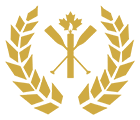Your history. Your inbox.
With 7 uniquely curated newsletters to choose from, we have something for everyone.

What's happening in your neighbourhood?
Nominate an exceptional history project in your community for this year’s Governor General's History Award.
2025 Governor General’s History Awards

The Governor General's History Awards
Celebrating the very best in Canadian achievements in the field of history and heritage.




















